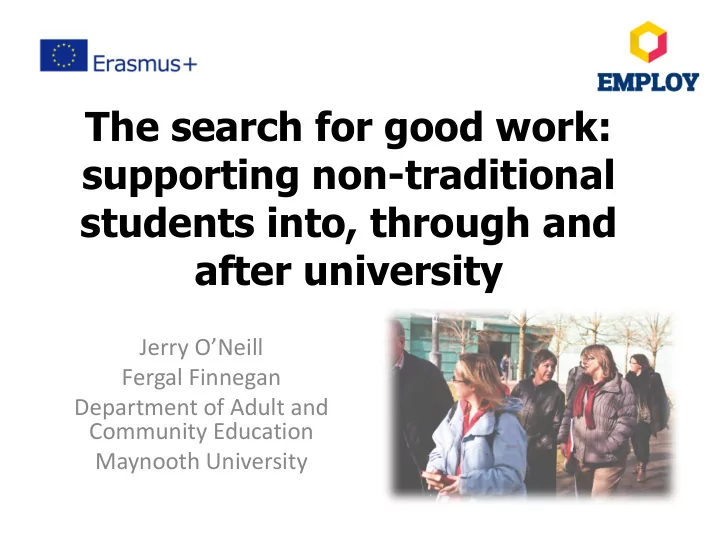

The search for good work: supporting non-traditional students into, through and after university Jerry O’Neill Fergal Finnegan Department of Adult and Community Education Maynooth University
Project no. 2014-1-UK01-KA203-001842-TP EMPLOY – rationale and objectives Rationale: using biographical research to addressing a major gap • in research on access and equality. Objectives: • 1. Understand employability from the ‘non-traditional’ student and graduate perspective. 2. Explore the impact of age, gender, class, ethnicity and disability on graduates and students’ experience, expectations and transitions. 3. Find out about the attitudes and needs of employers in different sectors. 4. Seek out the views of university staff. 5. Map the different HE contexts and identify the differences and similarities across Europe. 6. Think about how we can best support non- traditional graduates.
EMPLOY – Enhancing the Employability of Non-Traditional Students in HE No. 2014-1-UK01-KA203-001842-TP Partners
Who we spoke with Cohorts: Ireland (Maynooth EMPLOY network University) (x6) Final year 20 185+ + 14 (2 nd interviews) undergraduates Graduates 10 60 Employers 10 60 University staff 10 60 Total 64 365+
Speaking with a range of audiences • Website: http://employ.dsw.edu.pl • Podcasts • Handbooks (one for students; one for university staff/employers) • Video • Twitter: @EMPLOY2016 • Leaflets • Consultation and listening to advisory groups • International and national conferences • Papers, articles and in the future a book.
What we learnt from students and graduates • Remarkable commitment and determination of people over very long periods of time. • High value given to education especially for ‘naming the world’ and carving out space and time for personal development. • Importance of ‘good work’. • Hidden barriers in college and the labour market: class, care responsibilities and disability. • Uncertain destinations and risky transitions. Precarity commonplace after college. • The degree is no longer enough!
Uncertain pathways and risky transitions
Learning across the research cohorts: Staff and employers’ views • Highly varied perspectives across and within cohorts. • Employers search for talent and the importance of ’that little bit extra’. • Staff approaches largely dependent on their role and professional interests. • Shared desire amongst most staff and employers in supporting non-traditional graduates but not always clear how this can be done.
Departure points: for MU and beyond v Ensure there is space and time to explore career options through peer support, mentors, access offices, departments and career services. v Need to bear in mind many students do not have access to accurate information on how degrees link to careers. v Recognise the importance of placements and work experience v Foster social networks. v Gather more fine-grained data in HE and in labour market destinations research
Recommendations for employers Work with universities, student bodies, societies, other • stakeholders to create meaningful placement/internship opportunities for minority groups Look critically at the notions of mobility and flexibility • Examine recruitment practices for unintended bias. • Review work practices and policies that may create barriers for • minority groups Explicit targeting of non-traditional groups in recruitment processes • Engage and develop in sustainable partnerships with universities, • student organisations, NGOs, employer bodies that will enhance diversity in your workplace over time
Where next? • Opportunity to do something groundbreaking? • Need to collaborate within and beyond the university and approach these issues in an integrated and systematic way.
Many thanks and please visit • Website: http://employ.dsw.edu.pl • Twitter: @EMPLOY2016
Recommend
More recommend